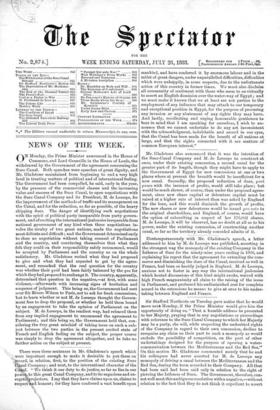NEWS OF THE WEEK • • O N Monday, the Prime
Minister announced in the House of Commons, and Lord Granville in the House of Lords, the withdrawal by the Government of the agreement concerning the 'Suez Canal. Both speeches were speeches of great dignity, and Mr. Gladstone maintained from beginning to end a very high level in treating matters of political and of international feeling. The Government had been compelled, he said, early in the year, 'by the pressure of the commercial classes and the increasing value and success of the Suez Canal, to open negotiations with the Suez Canal Company and its President, M. de Lesseps, for the improvement of the methods of traffic and its management on the Canal, and for the reduction, so far as passible, of the heavy shipping dues. The danger of identifying such negotiations with the spirit of political party inseparable from party govern- ment, and of exciting the international jealousies inseparable from national government of any kind when these negotiations in- volve the rivalry of two great nations, made the negotiations most delicate and difficult; and the Government determined early to close no negotiation without taking counsel of Parliament and the country, and convincing themselves that what they felt they could on their responsibility safely recommend, would be accepted by Parliament and the country as on the whole satisfactory. Mr. Gladstone recited what they had proposed to give and what they had expected to get by the agree- ment, and remarked that the real question for the country was whether their quid had been fairly balanced by the quo for which they had proposed to exchange it. The country, apparently, determined that question in the negative,—at first, with some violence,—afterwards with increasing signs of hesitation and suspense of judgment. This being so, the Government had sent over Sir Rivers Wilson to Paris, not to ask for fresh concessions, but to learn whether or not M. de Lesseps thought the Govern- ment free to drop the proposal, or whether he held them bound by an engagement to take the opinion of Parliament on the subject. M. de Lesseps, in the readiest way, had released them from any implied engagement to recommend the agreement to Parliament; and this being so, the Government held that, con- sidering the very great mischief of taking issue on such a sub- ject between the two parties in the present excited state of French and English feeling on the subject, the proper course was simply to drop the agreement altogether, and to take no further action on the subject at present.


































